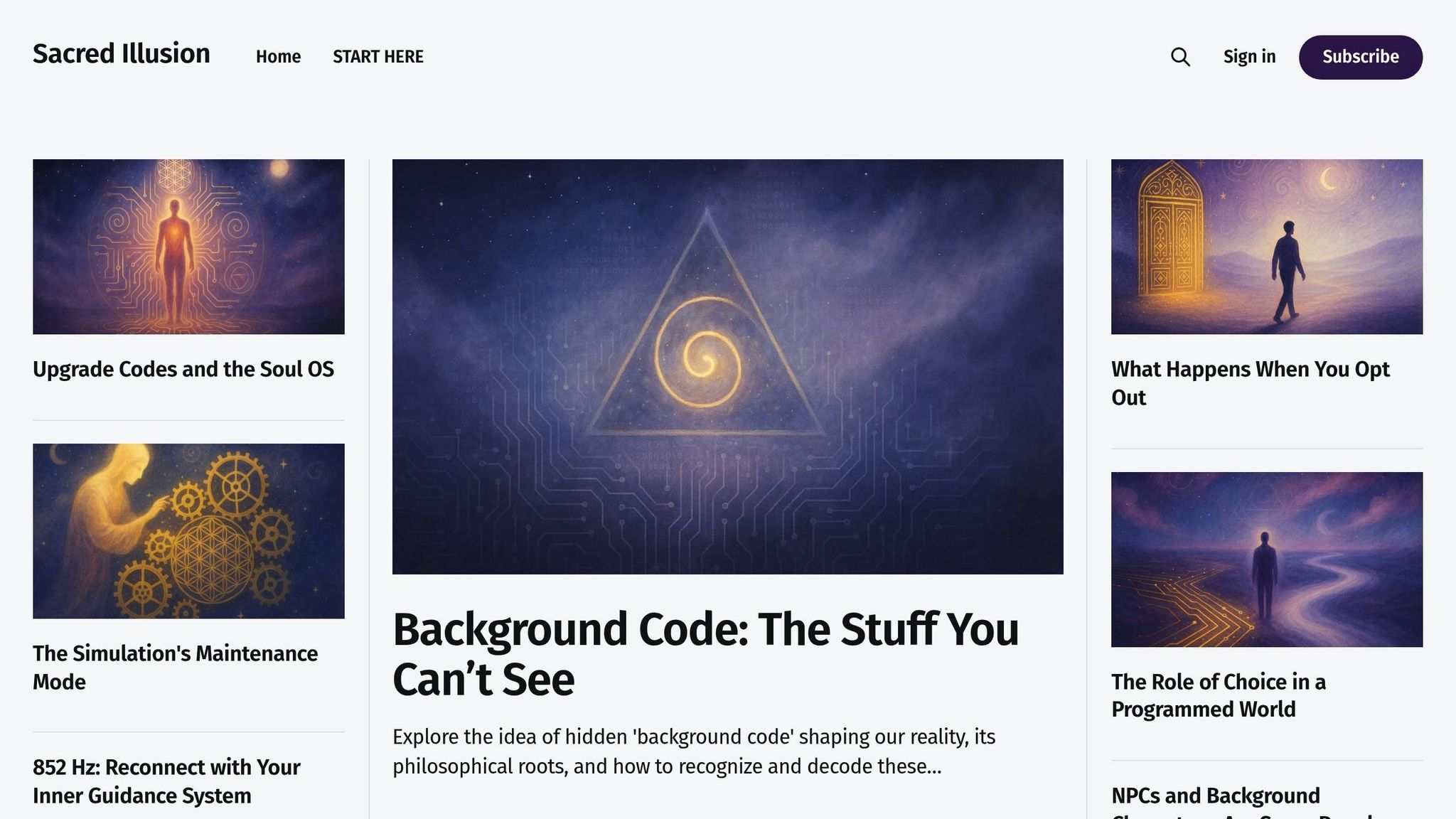Are There Cheats in the Simulation?
Explore the intriguing concept of simulation cheats, blending ancient wisdom with modern techniques for personal growth and ethical considerations.

What if life had cheat codes like a video game? Simulation theory suggests our reality might be a highly advanced computer simulation, and if that's true, there could be ways to "hack" it. These "simulation cheats" could help us bend the rules of reality, much like cheat codes in games. Here's what you need to know:
- Simulation theory basics: Philosophers like Nick Bostrom argue that advanced civilizations could create simulations indistinguishable from reality. If so, we might be living in one right now.
- Cheat codes for life: Techniques like visualization, manifestation, and focused intention could act as "reality hacks" to influence outcomes and achieve goals.
- Ethics matter: Using these methods responsibly is crucial, as they can ripple through shared reality, affecting others.
Whether you're curious about bending reality or exploring the limits of human potential, this article breaks down the concept of simulation cheats, their methods, and the ethical considerations involved.
Simulation Theory and Cheat Codes Explained
What Is Simulation Theory?
Simulation theory suggests that our reality might not be what it seems - it could actually be a sophisticated computer program designed and controlled by an advanced intelligence. Think about how we create detailed virtual worlds in video games today. Now imagine a civilization far ahead of us, capable of constructing an entire universe as a digital simulation.
"The Simulation Theory is a concept that challenges our understanding of reality, suggesting that our existence might be akin to a computer-generated simulation." – Nic James
Interestingly, this idea isn't entirely new. Ancient philosophies, such as the Hindu concept of Maya or Buddhist teachings on illusion, share similar themes of questioning the nature of reality.
Max Planck, the father of quantum theory, once remarked:
"There is no matter as such! All matter originates and exists only by virtue of a force which brings the particles of an atom to vibration and holds this most minute solar system of the atom together… We must assume behind this force the existence of a conscious and intelligent Mind."
Even modern thinkers have embraced the theory. Elon Musk, for example, has famously stated that it's more likely we live in a simulation than in "base reality". For some, this perspective sparks a sense of wonder and opens the door to merging spirituality with technology in new and unexpected ways.
This conceptual backdrop also gives rise to the idea of cheat codes - practical tools that could potentially let us manipulate the "rules" of the simulation.
Cheat Codes as Reality Hacking Tools
If we truly live in a simulation, it’s possible that, like any well-designed game, there are hidden shortcuts built into the system. In video games, cheat codes were initially created by developers as testing tools, allowing them to explore different parts of the game or debug mechanics more efficiently. Over time, these codes became a feature in final releases, offering players unique ways to interact with the game.
The concept of "reality hacking" takes this idea and applies it to the world around us. In essence, it's about using creativity and resourcefulness to manipulate existing systems in ways they weren’t originally designed for.
"Reality hacking is kinda like magic life hacks. You find things around you in reality, objects or complex systems, and you use your understanding of those objects and systems to make them do things they were never intended to be used for, but it's still effective anyway." – crypticarchivist
While reality coding might involve directly programming specific outcomes, reality hacking focuses on bending the existing rules in clever ways. It’s a bit like what speedrunners do in video games - finding ingenious methods to bypass obstacles and achieve their goals faster.
This drive to "hack reality" reflects humanity's innate curiosity and desire to navigate complex systems in unconventional ways. As we deepen our understanding of both digital and physical worlds, the question shifts from whether these techniques work to how they can be applied responsibly and effectively.
The Simulation of Reality and 3 Ways to HACK the System
Types of Simulation Cheats
Expanding on the concept of reality hacking, let’s delve into techniques often referred to as simulation cheats. These methods aim to reshape reality, blending mental exercises and shifts in perception to create outcomes in unconventional ways.
Manifestation and Visualization Methods
At the center of many discussions about simulation cheats is manifestation. This isn’t about simply wishing for something - it’s about setting clear intentions and aligning your actions to bring those intentions to life. Entrepreneur Deepak Ravindran explains:
"Manifestation is not just about wishing for something; it's about setting intentions and aligning your actions to make those intentions come true."
A key component of manifestation is visualization. This involves mentally picturing the life you want, focusing on the positive imagery of achieving your goals. Jack Canfield highlights its impact:
"Visualization activates the creative powers of the subconscious, motivating it to work harder at creating solutions."
Interestingly, research suggests that engaging in process visualization - imagining the steps needed to reach a goal - can be more effective than solely picturing the end result. For example, when you visualize your goals, your brain exhibits activity similar to what happens when you physically perform the task.
There are real-world examples of this practice in action. Actor Jim Carrey famously wrote himself a $10 million check and visualized his success until it became a reality. Similarly, the creators of Chicken Soup for the Soul® created a mock bestseller list featuring their book at number one - a vision that eventually came true.
Other techniques complement visualization, such as:
- Affirmations: Repeating positive statements to build confidence and reinforce your ability to achieve goals.
- Scripting: Writing about your goals as if they’ve already been accomplished.
- Gratitude practices: Shifting focus to what’s going well in your life, fostering a positive mindset.
These methods work together to create a mental environment where achieving your goals feels not only possible but inevitable.
Awareness Shifts and Lucid Living
Another powerful simulation cheat involves heightened awareness. Many people go through life on autopilot, missing subtle opportunities and patterns that could lead to success. Lucid living encourages you to become fully present, paying close attention to your thoughts, emotions, and surroundings. This heightened awareness can help you notice connections and possibilities that others overlook.
Researcher Lucius Matthiesen poses an intriguing question about this idea:
"We all know that perception creates or at least shapes our reality. But how far is it possible to push this particular envelope?"
Mindfulness practices are central to this approach. By staying focused on the present moment, you can better recognize opportunities that align with your goals. This idea ties into simulation theory, which suggests that perception influences the fundamental structure of reality.
Taking this further, identity hacking involves consciously adopting the mindset, habits, and behaviors of the person you aspire to become. Instead of waiting for success to feel successful, you act as though you’ve already achieved your goals. This shift in perspective can lead to unexpected breakthroughs and opportunities that seem to appear out of nowhere.
The idea is simple: when you operate with heightened awareness and a proactive mindset, progress often feels less linear and more serendipitous.
Reality Bending Through Focus and Intention
Another key technique is focused intention - holding a thought with intense focus for at least 17 seconds to begin turning it into reality. This practice strengthens neural pathways in the brain, helping solidify your goals.
Emotional amplification enhances this process. Emotions release chemicals in the brain that boost focus and motivation, making your intentions more impactful. Gratitude, in particular, is highly effective. Dr. Joe Dispenza explains:
"When you are in a state of gratitude, you transmit a signal into the field that an event has already occurred."
Over time, this creates a snowball effect. Consistent focus and emotional alignment influence your decisions, actions, and habits, gradually reshaping your reality. However, mental exercises alone aren’t enough. Taking tangible steps - like learning new skills, networking, or making strategic moves - amplifies these effects.
Action is essential in this process. As Abraham Hicks notes:
"Hard work is not the path to Well-Being. Feeling good is the path to Well-Being. You don't create through action; you create through vibration. And then, your vibration calls action from you."
This underscores the importance of pairing focused intention with inspired action. Dr. Joe Dispenza adds:
"The quantum field responds not to what we want; it responds to who we are being."
Ethics and Requirements for Using Simulation Cheats
When it comes to reality hacking, understanding your responsibilities is non-negotiable. These tools are not just about personal gain - they carry profound implications for others. Just as cheating in multiplayer games disrupts the experience for everyone, using simulation cheats in real life can ripple beyond your own journey, affecting those around you.
Clarity, Self-Awareness, and Practice
Ethical reality hacking begins with a deep sense of self-awareness. Without it, you risk misusing powerful techniques in ways that could harm yourself or others. As Joshua Freedman puts it:
"Emotional intelligence is a way of recognizing, understanding, and choosing how we think, feel, and act. It shapes our interactions with others and our understanding of ourselves."
In this context, emotional intelligence acts as your internal compass. It involves understanding your emotions, regulating them, staying motivated, empathizing with others, and honing your social skills. When you're in tune with your emotional state, you're better equipped to handle stress and make thoughtful, resilient choices.
Building this awareness takes practice. Activities like journaling, meditation, or mindfulness exercises can help you uncover patterns in your thoughts and emotions. Seeking honest feedback from trusted friends or mentors can also highlight blind spots you may not notice on your own.
Before diving into reality hacks, take time to define your core values and purpose. A clear moral framework not only guides your decisions but also reduces the risk of using these techniques for superficial or harmful reasons. Victor Frankl captures this sentiment perfectly:
"Between stimulus and response there is a space. In that space is our power to choose our response. In our response lies our growth and our freedom."
That "space" is where ethical reality hacking begins. By cultivating self-awareness, you gain the clarity to make conscious, responsible choices, ensuring your actions align with your values.
Ethical Considerations of Reality Hacking
Once self-awareness is established, the next step is to consider the ethical implications of using simulation cheats. These tools challenge ideas about fairness, manipulation, and even the nature of reality itself. The guiding principle is simple: your actions have consequences for others, even when you're focused on personal goals.
Think of reality as a shared experience, akin to a multiplayer game. As one expert notes:
"Cheating violates this social contract and undermines the integrity of the gaming experience for everyone involved."
Using reality hacks responsibly means recognizing your role within a broader community. Your success shouldn't come at the expense of others or create unfair advantages. A personal code of conduct built on honesty, integrity, and respect can help guide your choices. Ask yourself: if everyone used this method, would the outcome make the world better?
The difference between ethical and unethical reality hacking often boils down to intent and impact. Ethical approaches aim for outcomes that benefit everyone involved, while unethical ones prioritize personal gain without regard for the consequences.
Here are some principles to consider:
- Be transparent about your methods. For instance, if you're using visualization techniques to land a job, ensure your qualifications are accurately represented.
- Respect boundaries. Avoid manipulative tactics that distort others' perceptions or decisions. Focus on authentic connections and mutual benefits.
- Think long-term. Consider how your actions might affect your relationships, reputation, and integrity over time.
- Balance personal goals with collective well-being. Strive for outcomes that support positive change for both yourself and others.
It's also important to recognize the limits of reality hacks. Over-reliance on these tools can lead to neglecting practical actions and authentic relationships. To achieve lasting success, combine these techniques with traditional efforts like skill-building, goal-setting, and hard work.
Navigating the fine line between skillful use and unethical exploitation requires ongoing reflection. A true commitment to growth goes beyond personal achievements, aiming to leave a positive mark on the world around you.
Simulation Cheats vs Gaming Cheats Comparison
Expanding on the idea of reality hacking and simulation cheats, let's take a closer look at how these concepts stack up against traditional gaming cheats.
At their core, both simulation cheats and gaming cheats revolve around exploiting hidden mechanics within a system to gain an edge beyond what was originally intended. In gaming, cheat codes often began as tools for developers to test features, some of which made their way into final releases for players to discover and use.
Here's a breakdown of the comparison:
| Aspect | Gaming Cheats | Simulation Cheats |
|---|---|---|
| Purpose | To gain an edge, test features, or bypass challenges | To alter reality, achieve desired outcomes, or push the limits of natural assumptions |
| Method | Using cheat codes, memory editing, or developer tools | Employing mental focus, visualization, and intention-setting |
| Consequences | Possible account bans, loss of progress, reduced skill development | Ethical dilemmas, unpredictable results, and personal accountability |
| Verification | Immediate, visible in-game effects | Subjective experiences, gradual changes, and harder-to-measure results |
| Community Impact | Can disrupt fairness in multiplayer settings | Potential to affect shared reality and collective experiences |
| Developer Intent | Often created by developers for testing or fun | The concept of "reality developers" remains speculative and philosophical |
This side-by-side view highlights not only the functional differences but also the ethical challenges each method presents to its respective community.
The ethical stakes differ significantly between these two domains. For instance, research shows that 77% of gamers admit to using cheats occasionally, but the consequences are generally limited to the gaming environment. Gaming cheats, whether in single-player or multiplayer modes, affect the fairness and balance of the virtual world. On the other hand, simulation cheats could theoretically impact shared reality, introducing risks that are harder to predict or control.
As noted by De Paoli and Kerr, cheating in games threatens both the social experience and the economic stability of the gaming industry. To combat this, developers have implemented strict anti-cheat systems to protect fairness. Simulation cheats, however, operate in a largely unregulated and speculative realm, with no clear framework or enforcement to guide their use.
A key distinction also lies in the scope of impact. Cheating in single-player games primarily affects the individual, while in multiplayer settings, it can disrupt the experience for all participants. Gaming cheats often deliver immediate and tangible results, while simulation cheats rely on subjective perception and gradual manifestation, making their outcomes more ambiguous.
Both approaches raise important ethical questions. Gaming cheats typically violate terms of service, risking account bans or even legal consequences like breach of contract or copyright infringement. In contrast, simulation cheats operate in a gray area, as there are no defined "terms of service" governing reality itself.
Ultimately, both gaming and simulation cheats challenge the foundational rules of their systems. Gaming cheats can compromise the integrity and balance of gameplay, while simulation cheats provoke deeper philosophical questions about whether altering reality could breach an unspoken agreement about how life is meant to function.
This comparison invites further thought on how bending the rules - whether in games or life - can reshape the social contracts we rely on.
Sacred Illusion's Approach to Simulation Cheats

Sacred Illusion takes a refreshingly different stance on simulation cheats, steering clear of shortcuts or exploitative tactics. Instead of treating the idea of altering reality as a game to manipulate, the platform frames it as a profound journey of self-discovery, requiring deep introspection and a strong sense of ethics.
At its heart, the philosophy suggests that if reality is indeed a simulation or illusion, engaging with its mechanics isn't about "cheating" the system. It's about awakening to our role as conscious participants in a vast, interconnected cosmic design. This shift in perspective transforms reality hacking into something far more meaningful - a spiritual practice aimed at self-awareness and transformation. Sacred Illusion positions this approach as part of a broader exploration of reality as a tool for personal and collective growth.
Guides for Manifestation and Reality Bending
Building on this philosophy, Sacred Illusion offers practical guides for those who wish to responsibly explore the idea of simulation cheats. These guides focus on cultivating genuine skills and understanding, rather than chasing quick fixes. The emphasis is on developing awareness through deliberate and systematic practice, avoiding the temptation to force outcomes.
For example, their manifestation guides highlight the importance of setting clear intentions and practicing consistently. Rituals and exercises are designed to prioritize ethical considerations over mere technique. Practitioners are encouraged to take personal responsibility and to deeply consider the ripple effects of altering shared reality through focused intention. In short, effective reality bending requires more than just wishful thinking - it demands a nuanced understanding of consciousness, energy, and the intricate web of existence.
The Sacred Path of Awakening
What truly sets Sacred Illusion apart is its portrayal of simulation hacking as sacred work. Drawing inspiration from mystical traditions that view reality as an illusion, the platform reimagines simulation cheats as modern extensions of ancient spiritual practices.
Rather than focusing on manipulation for personal gain, Sacred Illusion encourages practitioners to embrace simulation hacking as a path to spiritual growth. By promoting values like compassion, wisdom, and service, the approach transforms these practices into tools for awakening. Practitioners are invited to treat their journey with reverence and humility, viewing it as a sacred endeavor that carries ethical responsibilities. This perspective elevates reality bending from mere manipulation to a deeply transformative spiritual pursuit, grounded in respect for the interconnectedness of all things.
Conclusion: Working with Simulation Cheats
Simulation cheats blend age-old wisdom with modern awareness, offering tools for profound personal growth. But using these tools effectively demands respect, responsibility, and a strong sense of commitment.
To truly benefit, you need to approach these practices with moral clarity, clear intentions, and ongoing self-awareness. It’s not about mastering a technique; it’s about developing the discernment to know when and how to use them responsibly. This naturally brings up essential ethical considerations.
As Achterbergh and Vriens put it:
"Ethical facilitation is to behave as ethically as possible given the circumstances".
Transparency and self-reflection are non-negotiable. These ensure that your actions are geared toward growth and learning, rather than manipulation or control. The ultimate goal is always education and self-improvement.
Practical wisdom comes from embracing multiple perspectives and personal insights. Engaging with a community, seeking mentorship, and having open dialogues can deepen your understanding and enrich your practice. Creating a safe and respectful space for learning - both for yourself and others - is essential as you navigate these techniques.
Simulation cheats should be viewed as sacred tools, not casual experiments. Continuous learning and adaptability are key to keeping these practices effective and ethically sound. Staying curious, acknowledging the limits of your knowledge, and treating every experience as a chance to grow are vital elements of this journey.
Whether you see reality as a simulation, an illusion, or something else entirely, the guiding principles remain the same: approach with reverence, act with integrity, and recognize that the most powerful "cheat code" might simply be awakening to your role as a conscious participant in the grand design of existence. By weaving wonder with responsibility, these practices can transform reality-shaping into a deeply spiritual endeavor, as suggested by the principles of simulation theory and Sacred Illusion's teachings.
FAQs
Is it possible that we’re living in a simulation? What evidence supports this idea?
The concept that we might be living in a simulation stems from the simulation hypothesis. This idea suggests that advanced civilizations could potentially design virtual realities so detailed and immersive that they would be indistinguishable from actual life. Some scientists and philosophers believe this opens the possibility that our reality could be one of these simulations.
Quantum mechanics often enters the conversation here. Its peculiar and probabilistic behavior of particles has been pointed to as a possible clue that our universe might be simulated. Philosopher Nick Bostrom also explored this in his argument: if advanced civilizations are capable of creating countless simulations containing conscious beings, then statistically, it’s more likely we’re living in one of those simulations rather than the "base" reality. While intriguing, this theory remains speculative, as there’s no concrete evidence to confirm or refute it.
How can I ethically use techniques like manifestation and visualization to create positive changes in my life?
To use manifestation and visualization in an ethical way, begin by setting clear, specific goals. Imagine your desired outcome as vividly as possible - engage all your senses and focus on the emotions you’d feel if it were already real. This mental connection helps align your thoughts and actions with your intentions.
Make daily visualization a habit and consciously release any doubts or fears that might block your progress. Celebrate small wins as you move forward; this builds confidence and keeps your momentum strong. By following these steps, you not only maintain a positive mindset but also take meaningful, proactive steps that align with ethical principles.
What are the risks of using reality hacking techniques, and how can they be applied responsibly?
Reality hacking techniques, while intriguing, aren't without their risks. If misapplied or misunderstood, they can lead to psychological challenges, like confusion or emotional distress. There's also the danger of unintentionally altering your perception of reality, which can be unsettling. On a larger scale, unethical use of these techniques could result in manipulation or even harm to others, raising serious ethical and legal issues.
To navigate these practices responsibly, it's essential to approach them with intentionality and ethical awareness. Be transparent in your methods, respect personal boundaries, and stay aware of the potential consequences of your actions. By keeping a balanced and informed perspective, you can engage with these techniques in a way that reduces risks and encourages positive, constructive experiences.




